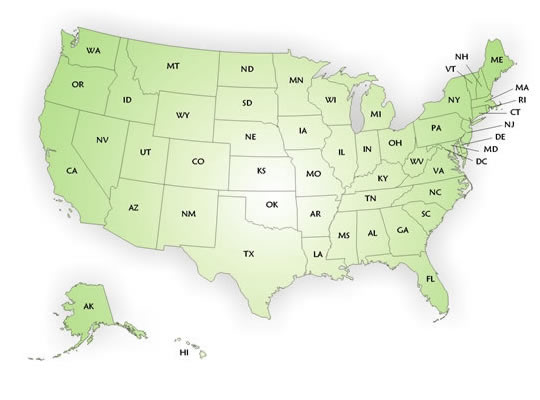United States Of America

About USA

The United States of America is a federal constitutional republic comprising fifty states and a federal district. The country is situated mostly in central North America, where its forty-eight contiguous states and Washington, D.C., the capital district, lie between the Pacific and Atlantic Oceans, bordered by Canada to the north and Mexico to the south. The state of Alaska is in the northwest of the continent, with Canada to the east and Russia to the west across the Bering Strait. The state of Hawaii is an archipelago in the mid-Pacific. The country also possesses several territories in the Caribbean and Pacific.
Education

Quality:
U.S. colleges are known worldwide for the quality of their facilities, resources, and faculty. Accreditation systems ensure that institutions continue to maintain these standards.
Choice:
The U.S. education system features many types of institutions, academic and social environments, entry requirements, degree programs, and subjects in which you can specialize.
Value:
A U.S. degree offers excellent value for the money. A wide range of tuition fees and living costs, plus some financial help from colleges, make study in the United States affordable for hundreds of thousands of international students each year.
Flexibility:
U.S. universities and colleges offer flexibility in choice of courses, but more importantly there is also the option for students to move from institution to another. Completing the first two years of a degree at one institution, usually a community college, and then moving to another, is very common.
Universities that we represent
- The University of Findlay - USA
- Sacred Heart University - USA
- California State University, San Marcos - USA
- University of California, Irvine Extension - USA (Certificate Programs)
- University of San Francisco - USA
- Wichita State University - USA
Qualifications Offered

Bachelor’s Degree: Degree Courses in Arts and Sciences.
Courses Offered:
Accountancy and Finance, Advertising, Animation, Architecture, Art, Design and Visual Communication, Business & Management, Computer, IT and Software Engineering, Construction, Criminal Justice, Economics, Education Studies, Engineering, English, Environmental Planning, Fashion and Textiles, Finance, Garden design, Geography, Graphic Design, Health and Social Care, Horology, Housing, Human Resource, Illustrations, Information Studies, Jewelry, Journalism, Landscape Architecture, Law, Management, Marketing, Media and Multimedia, Midwifery, Music, Nursing, Photography, Psychology, Public Relation, Quality Assurance, Radiography, Social Work, Social Sciences, Speech and Language Therapy, Surveying, Teachers training, Town and Country Planning.

Master’s Degree: USA Master’s degrees are respected and valued all over the world. Most universities require good performance at the undergraduate level, in relevant area, in order to consider admission into their Master's level programs. Most Master's programs are of 24 months duration.
Courses Offered:
Accountancy and Finance, Architecture, Art, Design & Visual Communication, Banking, Business & Management, Computing, IT & Software Engineering, Construction, Education & Teacher Training, Engineering, English, Environment, Fashion, Finance, Garden Design, Health & Social Care, Horology, Housing, Information Studies & Library Mgmt., Jewelry, Journalism, Landscape Architecture, Law, Logistics, Management, Marketing & Public Relation, Media, Multimedia & New Media, Music, Nursing & Midwifery, Planning, Property & Construction Mgmt., Quality Assurance, Radiography, Social Sciences & Research Programs after Graduation.
Admission Requirements

Admission is based on individual institutions' requirements.
- Good academic background.
- Good Test Scores in your English Language Test such as IELTS or TOEFL before the university will confirm your seat on the course . Minimum scores required are 6.0 to 7.0 for IELTS and 213 to 250 (CBT) for TOEFL. The minimum score required in TOEFL by most universities for admission is 82 (Internet Based Test) and 230 (Computer-based test).
- If applying to Bachelors program you may be required to take the SAT (Scholastic Aptitude Test), the AT (Achievement Test) or the ACT(. Masters and Doctorate programs may require the GRE (Graduate Record Exam) or the GMAT (Graduate Management Aptitude Test) or the LSAT (Law Scholastic Aptitude Test).
- Recommendations Letters (Provided by lecturers/professors/ Principal who have taught you at your undergraduate level. Recommendations must reflect you academically and even personally.
- The personal essays, and/or statement of purpose, play a very important role in the process of evaluating your application for both admission as well as financial aid because it gives the faculty assessing your application their most significant impression of you as an individual.
- Résumé is an important part of your application. It must include all information of professional work experience along with the details like positions held, achievements and range of work. Many A number of professional and vocational courses require relevant work experience. For instance, many MBA's or master’s courses in information studies require at least a couple of years’ work experience.


